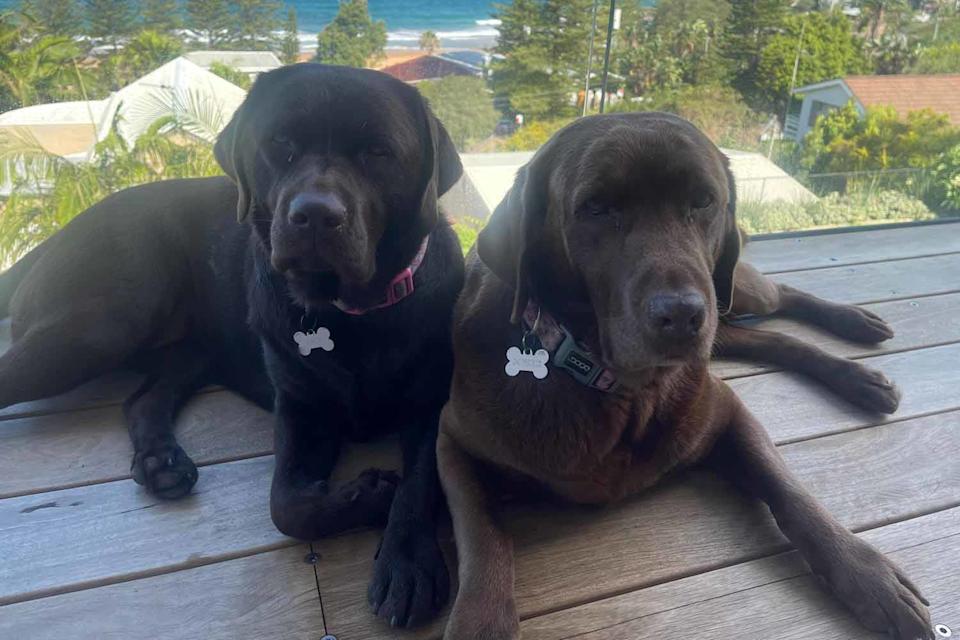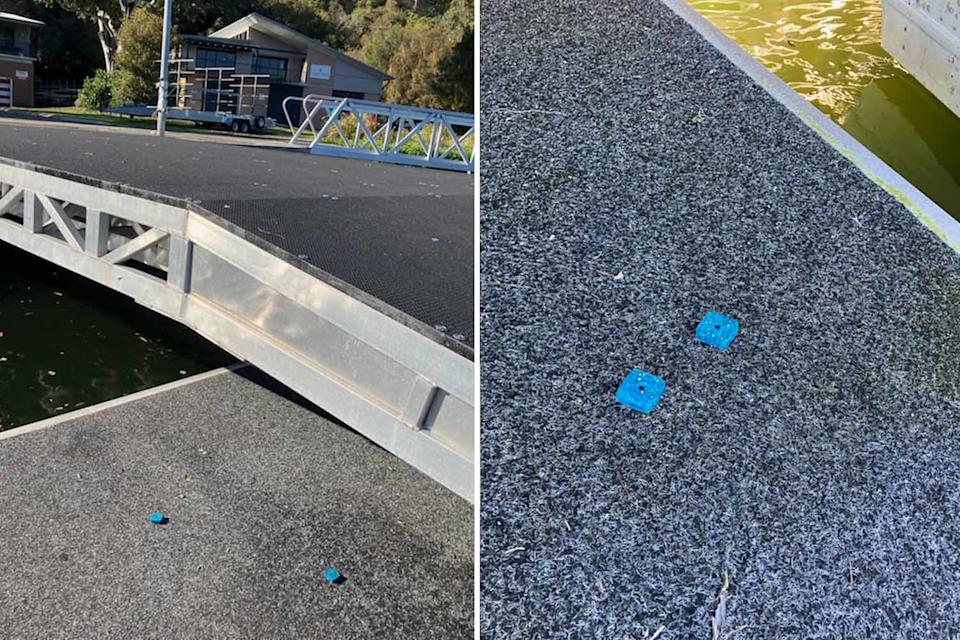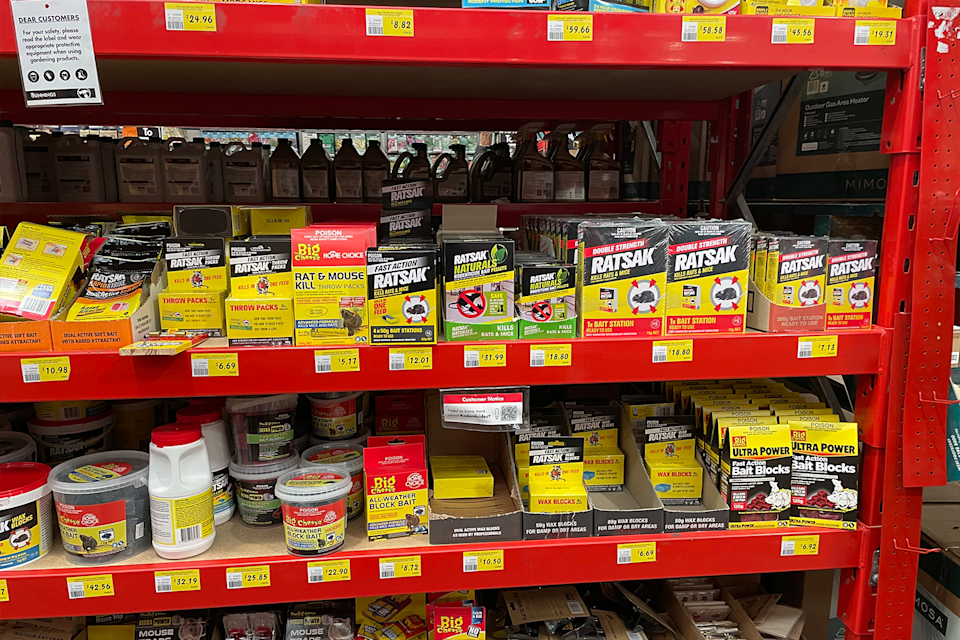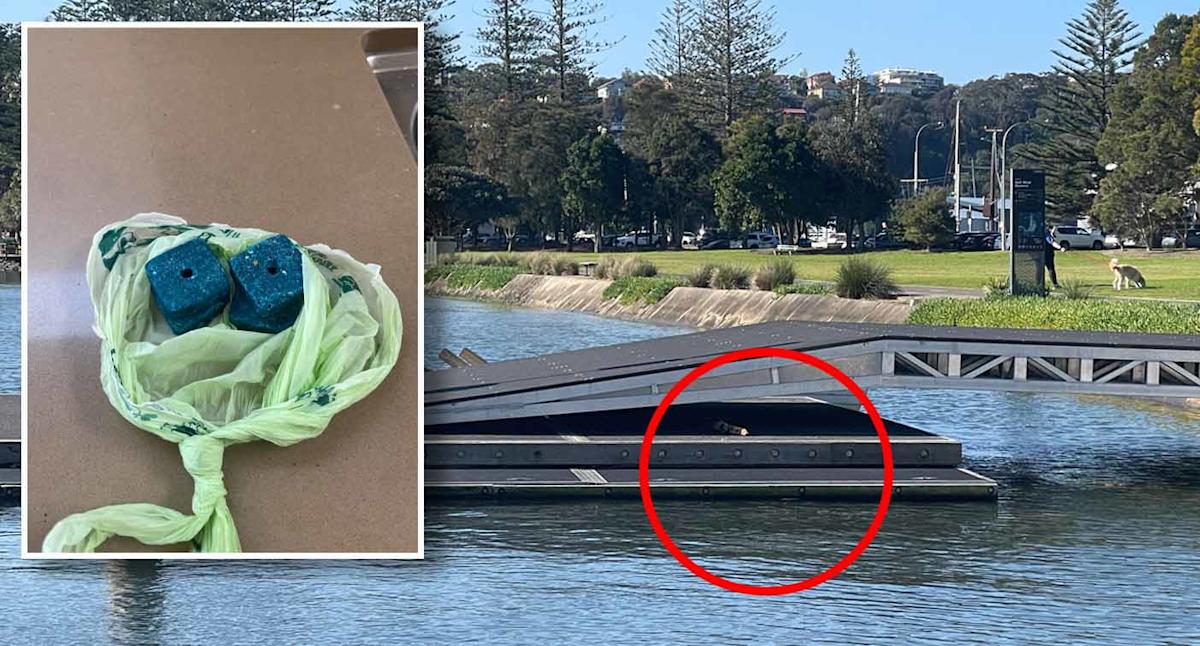Residents in a ritzy suburb are living in fear that a serial poisoner is targeting a popular public area on a near-daily basis. It comes as piles of rodenticide were found strewn along a pontoon at Spit West, a popular off-leash dog walking spot in Sydney’s north, over the course of several days. Several pets have been hospitalised after ingesting the blue baits.
Last week, a resident who asked to remain anonymous told Yahoo News she was forced to race her dog to the vet after her two-year-old chocolate Labrador Gigi ingested the rat poison, which was carelessly left in the public area with no warning signs.
Shockingly, it’s the second time this year that her beloved pet has been poisoned in the same place after a similar incident in February nearly killed her and left the owner with $4,000 worth of vet bills.
“We are all petrified,” she told Yahoo News, fearing that the next victim could die.

Gigi and Pepper regularly spend their morning walk at the Spit Reserve. Source: Supplied
Poison baits are a ‘ticking time bomb’
In the most recent poisoning, the Labrador-owner explained she was “hot on the heels” of her dog when she spotted her jump onto the pontoon, the same location where the last poisoning in February took place.
“I ran after her, but she was much faster; she’d already taken a bite,” she said. The woman collected the rest of the toxic bait from the ground so no one else’s pets were tempted and raced to the vet. Fifteen minutes later, the dog had an injection to induce vomiting and a “great big blue lump” was sitting among her breakfast.
“She would have got really sick again,” the woman said, had she not recognised the signs. Shockingly, when the dog walker returned the next day, she said she found more poison, prompting a warning to be issued by local vets who told Yahoo that the situation is a “ticking time bomb”.
“That person is going to keep doing it until they’re caught,” emergency vet Dr Tim Hopkins said.
The woman has theories about who is laying the “highly illegal” baits, but is unsure if they are designed to target dogs in the area or a water rat problem. She has reported the incident to both the council and police.

Two rodenticide baits spotted at the Spit Reserve West last week. Source: Supplied
Mosman Council told Yahoo they were aware of the baitings, and were conducting daily patrols of the area.
“Without any CCTV or any known witnesses, it is difficult to determine who may be responsible,” a council spokesperson said.
“Council will continue conducting further checks in this area and consider any action to take, as appropriate.”
The spokesperson said the incident has also been reported to the NSW Environment Protection Authority.
Vet warns time is of the essence in ‘awful’ poisonings
SASH Northern Beaches Emergency Vet Dr Tim Hopkins told Yahoo News there have been “repeated cases” of people placing rodenticide in the area, an act he describes as “illegal”.
“The problem is it’s a popular dog walking area, and dogs will eat pretty much anything. It’s easy for one of them to get a lethal dose,” he explained.
He urged residents to report baiting if they suspect it’s taken place and to get pets to the vet as soon as possible. “If you bring your dog in promptly, we can prevent the poisoning from occurring, but if you wait 48 hours, the outcomes are much worse,” he warned.
Dr Hopkins said the signs of poisoning in dogs include lethargy, pale gums and blood in poo, or coming out of their ears or nose. “[Rat poison] stops the body from clotting, and without those clotting factors animals will bleed out of their orifices,” he said.

Second-generation anticoagulant rodenticides (SGARs) are openly sold on the same shelves as less harmful first-generation poisons. Source: Michael Dahlstrom
Calls for Coles, Bunnings, Woolworths, Mitre 10 to ban rodenticide
Dr Hopkins said that for dogs — and the rodents targeted by the substance — it’s an “awful” death.
“It’s probably one of the biggest welfare problems globally,” he said. “Rats and mice are very sentient and conscious animals, and we subject them to these horrible deaths when there are more humane methods. It’s not just the dogs, but generally an inhumane thing to do.”
Earlier this year, Yahoo News reported that 280 vets, doctors, farmers, scientists, and conservationists have signed an open letter calling on the nation’s chemical regulator to ban merchants from selling this “highly-toxic” form of rat bait to consumers.
Second-generation anticoagulant rodenticides (SGARs) are openly sold on the same shelves as less harmful first-generation poisons, traps and natural baits. Although there are warnings on packets, unless shoppers delve into the fine print, they’re unlikely to be able to tell the difference, and experts believe only professionals should be able to use these products because they’re so dangerous.
“Australia is lagging behind, allowing the continued use of SGARs in a way that is putting our wildlife and pets at risk,” it warns, dubbing it a “crisis” that needs “immediate intervention”.
Dr Hopkins said that pet owners who want to be “super cautious” should put muzzles on their dogs.
“The main thing is to be seen promptly, don’t wait overnight,” he said.
Do you have a story tip? Email: newsroomau@yahoonews.com.
You can also follow us on Facebook, Instagram, TikTok, Twitter and YouTube.


